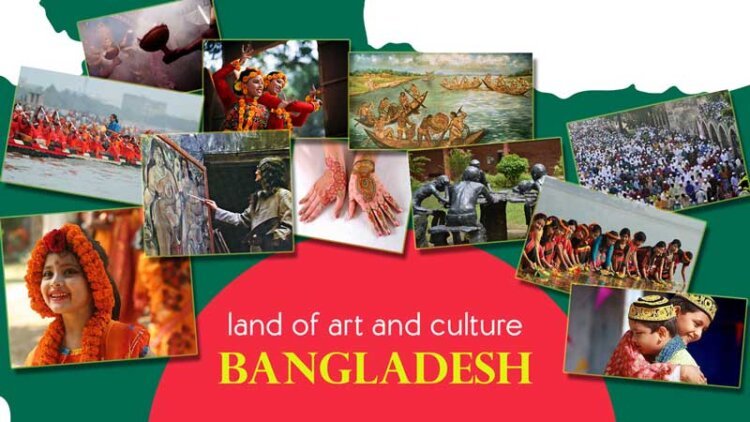In the mid-fourteenth century, Sultan Shamsuddin Ilyas Shah undertook a remarkable endeavor: to unify the fragmented regions of Rarh, Barendra, southern, and eastern Bengal. By liberating the Bengali territory from Delhi’s dominion, he sowed the seeds of a cohesive national identity—that gradually flourished into a culturally rich and politically potent society in the Indian subcontinent.
However, as history unfolded, this once-glorious land, “Bangalah” began to witness a decline in moral standards and a growing disinterest in its own cultural and traditional values. In today’s globalized era, this has turned into a curse, gradually loosening the fabrics of social order and cohesion that once held the nation together.
Fundamentally, cultural continuity safeguards a nation’s values, sense of belonging, and philosophical outlook. Hence, cultural erosion may often become the most strategic weapon deployed to impede a nation’s progress. Even in the context of contemporary Bangladesh, ignoring this reality is no longer an option.
During the ‘Bangalah Sultanate’, the prevailing cultural ethos was grounded in Islamic values intertwined with the local way of life, which shaped the nation’s moral compass and institutional frameworks. The socio-economic and political infrastructure of that era was founded upon equitable principles and indigenous customs that reflected the spirit of the people.
But the situation took a drastic turn toward the end of the eighteenth century, as British colonialists established their regime over the Indian subcontinent. This led to a fusion—often an imposition of European ideals upon native Bengali culture. Through colonial educational reforms, bureaucratic expansions, and communication strategies, Western cultural values found systemic endorsement.
As a result, indigenous dresses such as panjabi, lungi, dhuti, and other traditional attire were increasingly replaced by Western formal wear—pants, shirts, coats, and ties—particularly within the so-called elite classes. Similarly, our everyday speech now feels incomplete without inserting three to four English words in every sentence. The June 2025 case filed at Dhaka, where a teenage girl sued her own parents in court, is just one example of how hyper-individualistic Western ideologies are distorting the values of familial duty and mutual respect in our society.
Likewise, after the colonial era, Indian cultural hegemony began to take center stage, particularly in the post-Partition landscape of Bangladesh. Even institutional entities such as the Bangla Academy came under the influence of India’s aggressive linguistic and cultural politics, with sankritise the Bangla words policies. This intrusion sowed discord in our literary sphere, giving rise to ideological conflicts like the ongoing dissonance between the legacies of Kazi Nazrul Islam and Rabindranath Tagore. Through these, the seeds of division were planted deep.
Ironically, during the independent Sultanate period, Muslims-Hindus, and other religious communities in Bengal used to live together in harmony. Though the governance structure reflected a blend of Islamic and Bengali values, it never fostered hatred or violence against any community. But by the mid-20th century, colonial powers successfully disrupted this communal harmony through their divide-and-rule tactics.
Furthermore, various so-called cultural movements and institutions—led by certain university professors, organizations like Udichi and Chhayanaut, and ideologically driven artists—began weaponizing culturally incongruent elements under the guise of national cultural progress in Pakistan era. This tampering eventually led to ideological confusion and identity crises, evidenced by repeated debates surrounding our own cultural festivities like the celebration of ‘Pahela Baishakh’.
Then, after 2000, with the rapid development of satellite communication and internet access, a new kind of cultural crisis emerged in Bangladesh. Mass media and digital platforms became flooded with family-destroying visual and textual content—imported primarily from the West and neighboring India. Foreign mega-serials, reality shows, and online materials began to normalize dysfunctional relationships, materialism, and a nihilistic disregard for community-based living.
As a result, today Bangladesh is facing an alarming wave of social decay. Drug abuse, vulgarity, extramarital affairs, divorce, family breakdown, sexual perversion, unrestrained individualism, murder, suicide, rape—all these social and moral calamities have become disturbingly common. The very fabric of our society is unraveling under the weight of these crises.
Recent statistics also reveal that approximately 80% of divorce cases in Bangladesh were triggered by behavior influenced by the Indian television serials. Moreover, from 2017 to 2020 alone, over fifty individuals committed suicide due to issues linked to Indian serials, according to an article published by Protidiner Sangbad on July 17, 2021.
This growing chaos is not coincidental. It is the direct outcome of a long-standing cultural subjugation campaign—one designed to dismantle the foundations of a peaceful, coherent, and morally upright society.
Although there have been some recent attempts at reform in various sectors of Bangladeshi society, these efforts must be swiftly channeled toward a broader cultural renaissance. Reviving and reestablishing authentic Bengali culture—rooted in morality, dignity, and harmony—is not merely a sentimental wish, but a strategic necessity for national survival.
Notably, during the celebrations of both Pahela Baishakh and Eid-ul-Fitr this year, we witnessed a positive shift. Ours real traditional norms were more visibly honored and embraced by the wider population. However, there is still an urgent need for deliberate, strategic, and multifaceted cultural policies to restore our lost heritage.
Rusaid Ahmed is working with The Catchline as a Special Correspondent from Rangpur, Bangladesh. He is also a freelance journalist who regularly contributes columns to leading national dailies in both Bengali and English, covering national and international affairs. Alongside journalism, he writes poetry, short stories, and feature articles for various media outlets. Passionate about language, he also enjoys translating literary and journalistic works. He can be reached at: rusaidahmed02@gmail.com



